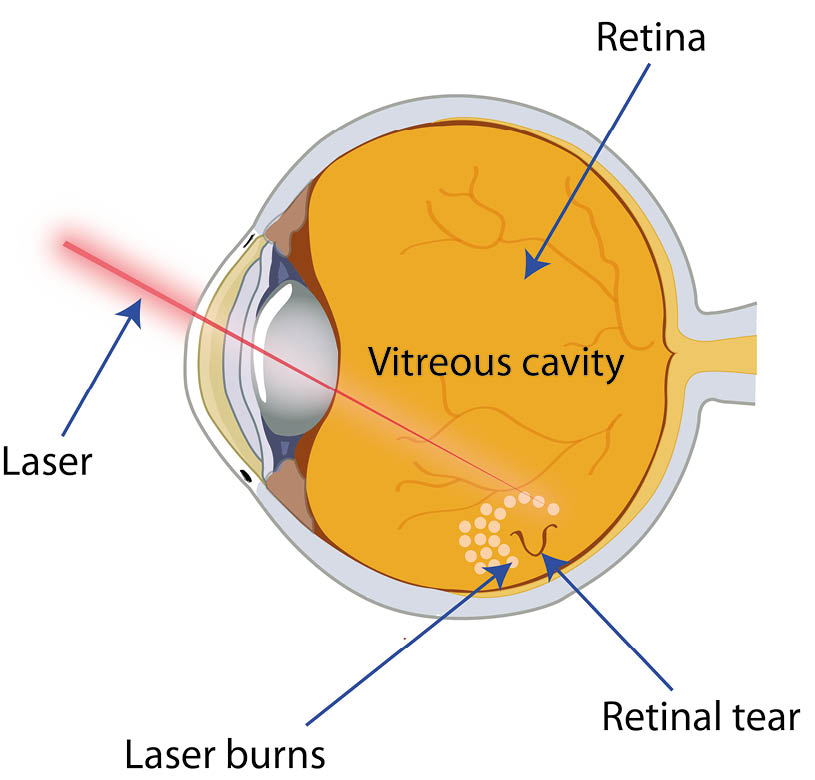Laser retinopexy
Information for patients from the Ophthalmology Department
This leaflet is for people who have been diagnosed with a retinal tear in one or both eyes. It is not meant to replace the information discussed between you and your doctor, but can act as a starting point for such a discussion or as a useful reminder of the key points.
What is the retina?
The retina is the light sensitive tissue at the back of the eye. It is made up of several layers. For the retina to work properly, these layers need to stay in contact with each other and with the underlying tissues.
What is a retinal tear?
As we get older, the jelly (vitreous humor) inside the back of the eye shrinks and can pull away from the retina; this is called a posterior vitreous detachment (PVD). This process can cause the retina to tear.
Some people, especially those who are short-sighted, could have weak spots and are more prone to retinal tears.
What happens if it remains untreated?
If left untreated, fluid can enter the tear and push the retina away from the underlying tissues, leading to a retinal detachment and loss of vision (sight).
What is laser retinopexy?

In laser retinopexy, a strong light beam is applied around the tear to seal or “spot weld” the retina to the underlying tissues. This can stop the retina from detaching.
Are there any alternatives?
Laser retinopexy is the usual treatment, but some people need cryotherapy which is a form of freezing treatment to the retina. Your options will be discussed with you before a decision is made.
Can I drive myself to hospital for my laser appointment?
We do not advise you to drive after laser treatment, as you may have blurred vision from the eye drops and feel temporarily dazzled from the laser light. You should arrange for someone to collect you from hospital after your treatment and take you home. You may use public transport.
You can drive the next day if you wish to.
What happens when I arrive for treatment at hospital?
Please report to the department reception stated in your appointment letter. The receptionist will direct you to the clinic, where you will be called by a member of clinic staff.
How long will I be at the hospital?
This procedure is performed on an outpatient basis, and does not need an overnight stay in hospital.
Allow one to two hours for your appointment. But be aware that you may be at the hospital longer or need extra visits, as this is usually done as an urgent procedure.
What happens before my laser treatment?
Before your treatment you may have a sight test, so please bring your distance glasses with you. If you wear contact lenses, please be ready to remove them for your appointment and bring your distance glasses if you have them.
You will be given drops to enlarge your pupil.
You will have your procedure explained to you before treatment begins. Please use this time to ask any questions before giving your consent to the procedure. Remember you can withdraw your consent for treatment at any time.
What happens during the laser procedure?
After your doctor has explained the procedure to you, an anaesthetic drop will be put in your eye to numb it.
Your doctor may then place a contact lens on the surface of your eye to focus the laser.
The doctor surrounds the tear with laser. You will see a series of bright flashes and may feel some discomfort in your eye.
The laser may be delivered through a device worn on your doctor’s head. If this is the case you will be asked to lie on your back for the laser procedure.
Your doctor may need to gently press on your eyelid with a small instrument to be able to see the tear, as it is often at the edge of the retina.
Will the procedure hurt?
You may feel some discomfort during treatment.
What happens after my treatment?
Immediately after the laser your eye will feel dazzled. Your vision will be misty for a few hours but should return to normal by the next day.
You can leave the hospital as soon as you feel ready, but you should not drive or operate machinery on the day of your treatment.
How do I look after my eye at home?
There is no special aftercare advice that you need to follow. If necessary your laser doctor will advise you of any precautions you need to follow, such as avoiding strenuous activity.
Will I need a follow-up appointment?
You will generally be seen again in the Eye Clinic at a later date to check your condition. The doctor will advise you and give you a slip to take to reception for them to book this appointment before you leave hospital.
What are the risks / adverse effects of laser retinopexy?
A membrane may develop on the centre of your retina (epiretinal membrane) which can distort your vision.
There is a risk of bleeding of your retina.
Occasionally the laser may not prevent a retinal detachment.
If you notice new flashing lights / a shower of floaters or a curtain blocking your outer vision, immediately contact your optometrist, GP, or Emergency Department who can refer you back to the Eye Department.
What should I do if my eye hurts at home?
If you have any concerns, or have pain or reduced vision for more than 24 hours after your laser treatment, please contact your consultant’s secretary (their phone number will be listed on your appointment letter).
If necessary you can contact your GP, optician, or Emergency Department.